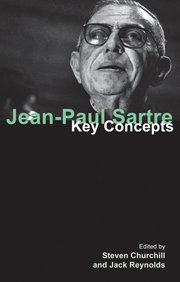Book contents
- Frontmatter
- Contents
- Contributors
- Acknowledgements
- Note on abbreviations
- 1 Introduction: Sartre vivant
- 2 Life and works
- Part I PSYCHOLOGY, PSYCHOANALYSIS AND LITERATURE
- Part II ONTOLOGY: FREEDOM, AUTHENTICITY AND SELF-CREATION
- 8 Nothingness and negation
- 9 The look
- 10 Bad faith
- 11 Authenticity
- 12 Knowledge
- 13 The fundamental project
- 14 Self-making and alienation: from bad faith to revolution
- Part III ETHICS AND POLITICS
- Bibliography
- Index
12 - Knowledge
from Part II - ONTOLOGY: FREEDOM, AUTHENTICITY AND SELF-CREATION
- Frontmatter
- Contents
- Contributors
- Acknowledgements
- Note on abbreviations
- 1 Introduction: Sartre vivant
- 2 Life and works
- Part I PSYCHOLOGY, PSYCHOANALYSIS AND LITERATURE
- Part II ONTOLOGY: FREEDOM, AUTHENTICITY AND SELF-CREATION
- 8 Nothingness and negation
- 9 The look
- 10 Bad faith
- 11 Authenticity
- 12 Knowledge
- 13 The fundamental project
- 14 Self-making and alienation: from bad faith to revolution
- Part III ETHICS AND POLITICS
- Bibliography
- Index
Summary
Introduction
Knowledge is a notion that occurs throughout Sartre's philosophical writings. From his early forays in phenomenology (Sartre 1970: 200a; 2004c: part A) to his late engagement with dialectical reason (Sartre 1960b: 30n, 31n, 502; 1985b), connaissance is a term that appears in almost every twist and turn of Sartrean argumentation.
Yet discussions of Sartre's conception of knowledge are anything but common. How may we best interpret that peculiar phenomenon of paucity of references to knowledge in the secondary literature, and overabundance of that term in Sartre's own texts? Part of the explanation, in my view, lies in the fact that knowledge for Sartre is what we may call a contrastive notion: knowledge is what consciousness – including one's primary relation to oneself, to one's own body, to other beings in a situation, and to the world – is not.
But what exactly is that notion with which so many other notions apparently get mixed up, and with which they ought not to be confused? In this chapter I shall sketch an answer to that question by considering a section from Being and Nothingness where Sartre sets knowledge itself as the focus of his discussion (BN1: 172–80; BN2: 195–203).
Our discussion will be limited in its focus: it will not address Sartre's views on knowledge throughout his voluminous output, nor will it try to account for every occurrence of “knowledge” in Being and Nothingness; instead, it will pay close attention to particular paragraphs of one section of that book.
- Type
- Chapter
- Information
- Jean-Paul SartreKey Concepts, pp. 143 - 151Publisher: Acumen PublishingPrint publication year: 2013

